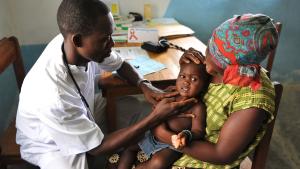Angola strengthens capacity building on Integrated Care for Childhood Illnesses.
Luanda, Angola, 04 July 2023 - Despite the significant efforts that have been made to improve child health, data from IIMS/2016 show that in Angola, 44 out of every 1000 children still lose their lives before their fifth birthday due to common childhood diseases such as malaria, diarrheal diseases with severe dehydration, severe malnutrition, and pneumonia, as well as complications arising from premature births, namely low birth weight, hyaline membrane disease, neonatal infections and asphyxia.
Therefore, the Ministry of Health, with the support of the World Health Organization (WHO), is developing a Training of Trainers for health technicians at central, provincial, and municipal levels in the areas of women's, child, community, nutrition and health promotion, in the expectation of improving the quality of services provided and reducing child mortality, specifically neonatal mortality, which is above 24/1000 live births (27/1000 in 2021), far above the recommended for achieving the Sustainable Development Goals (SDGs), estimated at less than 12 to 24/1000 live births.
According to the WHO Sexual and Reproductive, Maternal, Child and Adolescent Health Officer in Angola, Dr. Natercia de Almeida, this training is part of the priority activities of the 2023-2024 Biennium, defined by the Angolan Ministry of Health and WHO. "The training will continue to cascade to the rest of the country, given the urgent need to train primary level technicians who serve the child population and update knowledge based on the recently published WHO standards and guidelines.”
"By strengthening the capacity and skills of health technicians, we can ensure the improvement of care and service to the population and therefore the improvement of child indicators such as nutritional status; compliance with the vaccination schedule; arrest of health risks and early transfer when in the presence of danger signs."
Integrated Management of Childhood Illness (IMCI) is an integrated approach to child survival, growth, and development. It aims to reduce mortality in children under five years of age, with data on its utility based on the best available evidence. This approach was designed by WHO and UNICEF in 1999 to reduce child morbidity and mortality in developing countries with a shortage of specialized human resources.
Data from WHO evaluations of the correct implementation of the Integrated Management of Childhood Illness strategy in developing countries show great benefits from its expansion through the training of technicians with the aid of algorithms and manuals for the detection, classification, and transfer of children with suspected and symptomatic illnesses, as well as the follow-up of those without risks in childcare consultations, to monitor their normal development.
In Angola, IMCI was first implemented in the early 1990s and is structured according to three components recommended by WHO, namely improving the skills of health workers, improving the service delivery of the health system, and improving the practices of families and the community.
